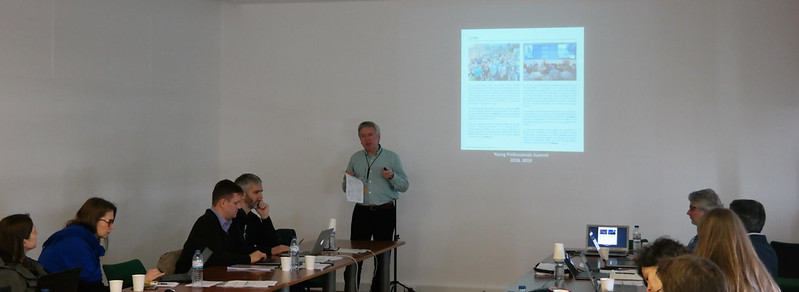Europa Nostra contributes to IMPACTOUR – European project to assess the impact of cultural tourism
The IMPACTOUR project aims to create an innovative, easy-to-use methodology and tool to assess the impact of cultural tourism on Europe’s economic and social development, and to improve policies and practices in this field. Europa Nostra is among the 12 project partners from 9 EU Member States who are working on this project between January 2020 and December 2022. Europa Nostra’s Board Member Graham Bell took part in the kick-off meeting held in Lisbon on 28-29 January. The meeting was hosted by the Universidade NOVA de Lisboa, the Project Leader. IMPACTOUR is funded by the EU Horizon 2020 Research and Innovation Programme with a budget of circa € 3 million.
The project will address the knowledge gaps concerning methods to measure different types of cultural tourism impacts and to assess multilevel and cross-border strategies, policies and practices and their contribution to sustainable development.
By identifying and comparing quantitative and qualitative pan-European information on types of cultural tourism, and by providing quantifiable evidence of cultural tourism strategies and their effect on European regions’ development and cohesion, IMPACTOUR will deliver an innovative methodology and tool for destination managers.
The project will develop a sustainable ecosystem by engaging cultural tourism stakeholders and implementing a participatory approach. The IMPACTOUR project will lead to reinforcing the commitment to enhance Europe as a cultural tourism destination, increasing local citizens’ sense of belonging, promoting minority cultures and strengthening identities, especially in marginal locations. The project’s methodology will be completed and tested with data coming from 15 Data Information Pilots and the IMPACTOUR tool will be validated in 5 Validation Pilots, with distinct characteristics spread around Europe.
The project partners are the Universidade Nova de Lisboa (Portugal), the Project Leader; the Cyprus University of Technology (Cyprus), the Institute of Baltic Studies (Estonia), Tecnalia (Spain), the European Network for Accessible Tourism (Belgium), ACIR Compostelle (France), Transromanica (Germany), Europa Nostra (The Netherlands), the Association of Municipalities of the Autonomous Region of the Azores (Portugal), the Estonian Tourist Board (Estonia), Matera Hub (Italy), and Cultur Viajes Patrimonio (Spain).
Europa Nostra’s Board Member Graham Bell comments on the project:
Why did Europa Nostra become a partner of this project?
The European Heritage Awards/Europa Nostra Awards and the 7 Most Endangered programme both highlight the benefits and risks of tourism dependency: tourism can bring essential economic sustainability but it can also suffocate communities. While some places are the ‘honey pots’ around which visitors congregate in ever-increasing numbers (sometimes bemoaning that congestion obscures the very thing they have come to see), other places yearn after the ‘crumbs’ – the secondary spill-over of tourists desperate to escape claustrophobia and search for undiscovered authenticity. How can this polarisation be rebalanced so that everywhere can benefit from an appropriate level of visitor income in return for enriching experiences? Europa Nostra is about ‘Our Europe’ – off the beaten track as well as the main attractions which will always be awesome. For example, ‘ENtopia’ was an initiative of Europa Nostra to support communities of modest means celebrate their spirit of place. Now, IMPACTOUR offers a framework and a partnership to build upon.
What is exactly Europa Nostra’s role in this project?
IMPACTOUR is a complex project to address issues that have challenged European countries for years. The intersectoral nature of the problems is reflected in the intersectoral expertise of the consortium. There are specialists in data analysis, tourism destination management, digital cultural heritage and inclusive accessibility. Europa Nostra brings sectoral knowledge to widen the pool of consultations to test emerging proposals. The Europa Nostra pan-European network and ‘community’, including its Board, Council and National Representations, will have opportunities to contribute data and comments on tourism, especially in marginalised locations. Europa Nostra is not a Work Package leader, rather we are a ‘market conscience’ of communities for whom this project is intended to help. Dissemination is a key part of any European project and so Europa Nostra’s extensive network will be engaged in sharing the project outcomes.
What are your impressions of the kick-off meeting held in Lisbon?
The kick-off meeting was an opportunity to introduce participants to each other and explore mutual understanding of each other’s roles and the project objectives. The host’s Portuguese hospitality accompanied their lead partner responsibility of clarity of purpose; this will be a well-run ship. Presentations from Work Package partners helped as a short-cut to quickly get to the essence of the main components of the project. Preparation for, and follow-up from, the kick-off meeting has been really encouraging.
What are the next steps/initiatives?
Getting word out about IMPACTOUR is critical for a project whose contributors and beneficiaries may be outside the conventional circles of cultural heritage. Social media is the platform of choice to be accessible for feedback and contributions. Already the project is live on Facebook and Twitter, so look out for us and sign up to be able to track progress. Online file sharing enables the most efficient communication of ideas and collective formulation of development proposals. Alongside developing the project’s communication capacity, measuring impact of cultural heritage tourism is a prerequisite of its management, so the first stage is to develop the methodology and with it the raw or ‘big data’ requirements. In addition, understanding where you are – what data already exists – is always the first step in a journey; Europa Nostra will be contributing to mapping existing relevant strategies and sources, including gaps which the project could fill. This includes liaising with other European projects so that everyone gains. Given climate change, this is a project about growing tourism quality, not quantity, in a way that is sustainable. For that, we all need to share precious resources.








